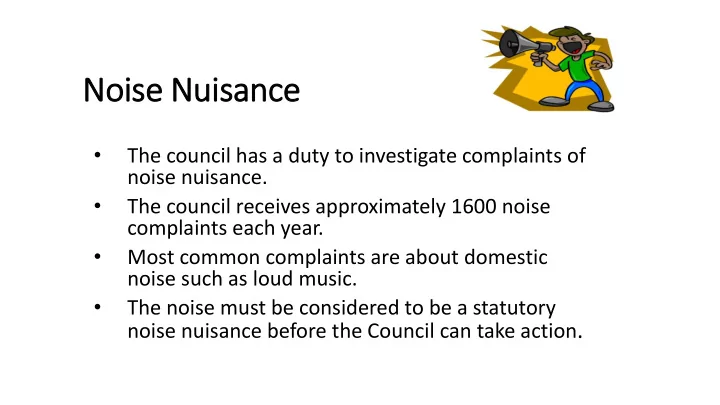

Noise Nuisance • The council has a duty to investigate complaints of noise nuisance. • The council receives approximately 1600 noise complaints each year. • Most common complaints are about domestic noise such as loud music. • The noise must be considered to be a statutory noise nuisance before the Council can take action .
Noise Nuisance • A statutory nuisance is 'an unlawful interference with a person's use or enjoyment of land or some right over, or in connection with it'. • A statutory noise nuisance is more than noise that is merely an annoyance but noise that is viewed to have a significant impact on the health and wellbeing of those affected.
Noise Nuisance Several factors are taken into account in determining if a noise amounts to a statutory nuisance. • Location . A cockerel crowing in the countryside would be more acceptable than that in a quiet urban residential road • Frequency . Noisy parties every weekend would be viewed differently to one held occasionally
Noise Nuisance • Duration . A dog barking at the postman or barking at cats occasionally passing by would be viewed differently to one barking most of the day • Time of day . The effects of noise late at night when most people are sleeping would be given greater weight than the same noise occurring during the day.
Noise Nuisance • Intensity . We all have different noise thresholds and tolerances. In determining nuisance the judgement would be how the noise would affect an ordinary individual, not someone who has a particular sensitivity to the noise being complained of.
Noise Nuisance • Number of people affected . A view will be taken on the number of people who are, or could be, affected by the noise. If only one person complains when the whole street could equally be affected, then there could be a challenge that the individual making the complaint could be unduly sensitive. • There is no specified decibel level which determines whether noise is a statutory nuisance. It is a subjective assessment taking into account all of the factors above .
Dealing with Noise Nuisance Before contacting the council you should: • If possible speak to the person making the noise. If you are not able to speak to them, then write to them. Sometimes people are unaware of the impact they are having on others. • Keep a diary of the noise you are experiencing, record the date, time and duration of the noise. Record these details over a period of at least 7 days. Make a recording of the noise if possible, for example using your mobile phone.
What the Council can do • We will respond to all complaints about noise. • We will ask residents to keep a noise diary. • We will visit to witness the problem first hand from within the complainants property. • We will speak to the person making the noise • Where necessary we will use calibrated noise recording equipment to evaluate the noise.
What the Council il can do • We must be able to witness the noise from inside the complainants property. • The complainant must be willing to provide a witness statement. • If a statutory nuisance is witnessed the Council has a duty to serve an Abatement Notice under the Environmental Protection Act 1990.
Enforcement Action • The Abatement Notice will require the person responsible for the noise to abate the noise within a specified period of time. This can be immediate in extreme cases. • If the person does not comply with the notice, this is an offence and the Council can either issue a fixed penalty notice of £100 for domestic noise or £400 for commercial noise or can prosecute the person responsible.
Enforcement Action • Officers can obtain a warrant from the courts to enter a property with support from the Police to seize noise making equipment. • Equipment will be retained until a Magistrate decides whether it should be returned or disposed of. • Alarms can be silenced without a warrant. • The council will recover its costs where works in default are carried out.
Out of Hours Noise Service • Residents can access the service on 020 8770 5000 • The out of hours noise service is available 365 days a year for : • Misfiring house or car alarms • Loud parties affecting more than one household • On going complaints where we need further evidence to take enforcement action. In these cases residents will be given a password which changes every month to activate the service.
Numbers of Noise Complaints Abatement Fixed Number of Notices Penalty Type of Noise complaints served Notices Building sites 161 Car alarms 25 Commercial 237 4 1 Barking dogs 163 Domestic 890 2 1 Premises Alarm 43 Noise In the Street 83 1 Total 1602 7 2
Recommend
More recommend